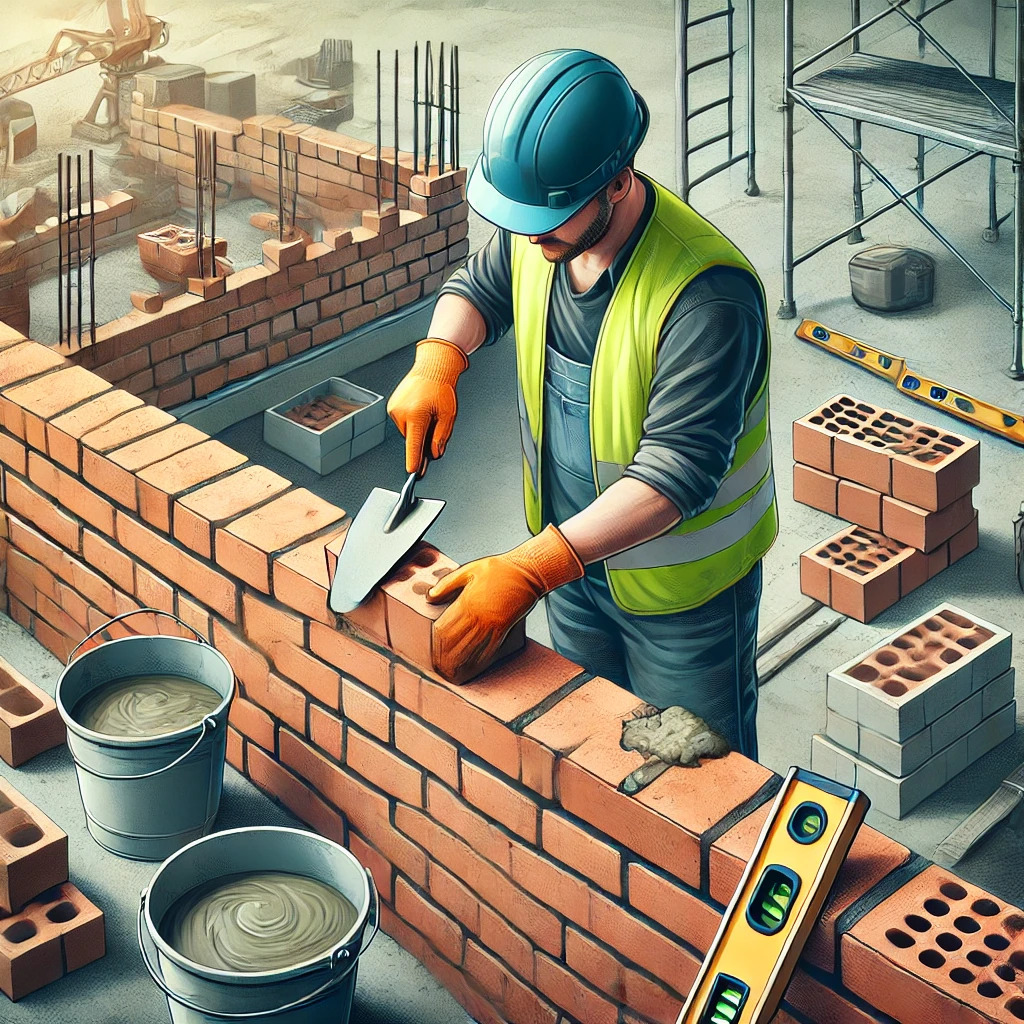Introduction to the Masonry Course
The profession of a mason is fundamental in any society. If you’re interested in pursuing a career in construction and learning the necessary techniques to build and repair various types of structures, this course is the ideal starting point. We will explore the skills, tools, and processes involved in the profession, providing the foundation for you to become a qualified professional.

In this first module of the course, we will discuss the work process, the labor market, product and service quality, as well as the importance of promotion and professionalism in the trade.
The Mason’s Work Process
A mason is an essential worker in construction, executing various techniques with different materials and tools. For those wanting to learn this profession, the starting point is understanding the process of building a house. The work begins with the foundations, continues with walls, columns, slabs, and moves on to completing the construction.
Imagine your community without the buildings that house essential services such as hospitals, schools, markets, and even homes. The mason’s work goes beyond simple constructions; it helps provide a basic human need: shelter. And to ensure these constructions are safe and functional, it is essential to follow specific procedures for the trade.
The Mason’s Job Market
Learning to be a mason offers broad job opportunities. From small repairs in homes to large commercial and industrial projects, the field is vast. A good mason can build houses of one or more floors, work on housing units, or contribute to commercial and industrial buildings.
In the commercial sector, the mason helps ensure the comfort and well-being of the building occupants. In the industrial sector, the commitment extends to creating productive and sustainable structures, supporting environmental conservation and sustainable development.
Regardless of the field, the mason’s role is to contribute to creating spaces that meet the needs of clients and the community.
Work Procedures – Essential Steps
A mason’s work involves several stages, each critical to ensuring the construction’s quality and safety. Let’s look at some of the main steps you’ll learn in this course:
Preparation and Cleaning
Before starting any project, the work area must be prepared and cleaned. This includes removing debris and organizing the space to ensure a safe and efficient environment.
Marking and Leveling
A fundamental step is marking and leveling the construction elements. This technique ensures that the building is executed precisely, avoiding structural problems in the future.
Structure Assembly
Here, students will learn to assemble structures for foundations, columns, and slabs. This involves cutting, bending, and tying materials, as well as preparing the formwork (the wooden mold used for concrete).
Pouring and Finishing
Pouring involves mixing and pouring concrete, as well as curing it (the process of strengthening the concrete). Finalizing the job includes cleaning the area and maintaining the tools.
The Importance of Product and Service Quality
One crucial point in masonry is quality. The quality of the services provided is verified by inspecting the work when it’s delivered to the client. In this course, you will learn the importance of following local building regulations to ensure that the work complies with standards.
Exceeding client expectations is a recommended practice for customer loyalty and future recommendations. This includes explaining in detail what will be done, offering improvement suggestions, and delivering the work within the agreed timeframe. To stand out as a professional, how you communicate with the client, your personal appearance, and your politeness are essential.
Promotion and Professionalism – The Key to Success
An important part of the mason’s profession is promoting your services. In this course, in addition to construction techniques, you’ll learn how to effectively promote your work. The best promotion is the quality of your service, but there are other ways to ensure your reputation as a mason grows, such as through continuous training.
Formal and Informal Training
You can choose to train formally by enrolling in technical construction courses or informally by learning from other professionals in the field. Regardless of the method you choose, the most important thing is to keep practicing and developing your skills.
Certification can also be an excellent way to professionalize your trade, gaining recognition from official institutions in your locality.
Your Journey in the Construction World Begins Here
Being a mason is more than just building walls and columns; it’s about contributing to society’s well-being. Learning to be a good mason requires practice, technique, and commitment to quality. In this course, you will learn all the essential aspects to become a qualified professional.
If you want to turn your passion for construction into a successful career, this course is the right path. Enroll now and take the first step towards mastering the art of masonry!